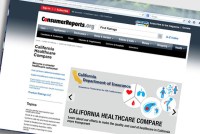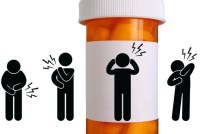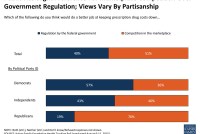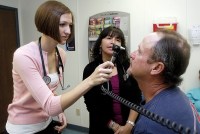Latest KFF Health News Stories
IOM: Teamwork Key To Reducing Medical Diagnostic Errors
A report by an Institute of Medicine blue ribbon panel notes that taking steps to address this patient safety issue will involve efforts from across the health system.
Tech Options Helping Patients Wrest Control From Doctors
Dr. Eric Topol says smartphones and other technology allow patients to monitor and control their chronic health issues.
Attention Shoppers: New Calif. Website Details Costs, Quality of Medical Procedures
Seeking to create smarter consumers, the California insurance department unveils a website showing wide variation in costs and quality of medical services across the state.
Study Finds Improvements In Pay, But Not Equity, For Women Anesthesiologists
RAND Corp. researchers find that more women are going into anesthesiology and getting paid better, but they still trail their male counterparts.
Under Pressure, Hospitals Push Physicians To Improve Their Bedside Manners
Motivated by financial incentives and consumer demands, medical centers are creating programs to infuse more compassion and understanding into the doctor-patient relationship.
The Gender Gap Persists In Academic Medicine, Studies Find
Research in JAMA concludes that even after accounting for factors such as experience, age and research, women do not get promoted as often to full professor jobs in academic medical centers.
California Aid-In-Dying Bill Heads To Governor’s Desk
California would become the fifth state to allow doctors to prescribe lethal medication to terminally ill patients who request it.
Medicare Yet To Save Money Through Heralded Medical Payment Model
The government expected accountable care organizations to save Medicare millions by now, but the program is falling short of targets, records show. KHN also has performance data for all 353 ACOs in 2014.
This model of care is one of the ways created by the Affordable Care Act to reduce health care costs while improving quality of care. You can also watch the accompanying video that explains ACOs.
Calif. Lawmakers Approve Bill Requiring Drug Labeling In 5 Foreign Languages
If Gov. Jerry Brown signs the measure, all pharmacies will have to provide medication instructions in Spanish, Tagalog, Chinese, Vietnamese or Korean, the most common languages in California after English.
When The Hospital Is Boss, That’s Where Doctors’ Patients Go
Hospital ownership of doctors’ practices “dramatically increases” odds that a doctor will admit patients there instead of another, nearby hospital, researchers say.
Consumers With COBRA Coverage Should Weigh Moving To Health Law Plans
COBRA, which employees can buy when they leave a workplace if they pick up the entire cost of the plan, can be more expensive.
Heart-Attack Patients More Likely To Die After Ambulances Are Diverted
A study finds patients who suffered heart attacks in California were more likely to die within a year if their ambulances were diverted from the closest emergency room.
Private Money Saves Colorado IUD Program As Fight Continues For Public Funding
A dozen foundations contributed a total of $2 million to help more low-income teens and women obtain IUDs and other long-acting contraceptives.
NIH analysis quantifies who is in pain and when, including more than 25 million people who say they have pain every day.
Poll: Americans Favor Government Action On Drug Prices
A majority of Americans would allow Medicare to negotiate prices with drug companies and consumers to buy drugs from Canada.
Rural Hospitals Team Up To Survive
Dozens of rural hospitals have closed in recent years, prompting others to form alliances.
Bad Health Outcomes For Adults Who Don’t Get Help As Teens
Study reports adolescents’ unmet health care needs foreshadow problems later in life.
For Hospitals, Sleep And Patient Satisfaction May Go Hand In Hand
As hospitals try to improve their consumer ratings, many are revisiting nighttime policies to help patients maximize their chances to get some rest.
VIH: Promueven Píldora Preventiva Entre Hispanos
La medicación, que se usa como “Profilaxis de Pre Exposición” (PrEP), conocida comercialmente como Truvada fue aprobada por la Administración de Drogas y Alimentos (FDA, por sus siglas en inglés) en el 2012 para prevenir el VIH, y ha demostrado ser más de un 90 por ciento efectiva, cuando se la usa correctamente. Pero los trabajadores de salud están encontrando barreras culturales y económicas entre muchos latinos.


























